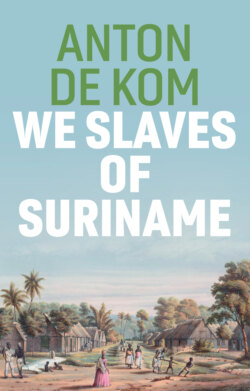We Slaves of Suriname

Реклама. ООО «ЛитРес», ИНН: 7719571260.
Оглавление
Anton de Kom. We Slaves of Suriname
Table of Contents
Guide
Pages
We Slaves of Suriname
Copyright Page
Translator’s Note
Frimangron Tessa Leuwsha
Note
The Breath of Freedom We Slaves of Suriname as Literature Duco van Oostrum
Double Consciousness
Facts Forgotten and Facts Suppressed
The Personal Decolonization of White Education
The Breath of Freedom
A Vision of Motherly Listening
Note
Bibliography
Why Anton de Kom Still Inspires Generation after Generation Mitchell Esajas
“Race” and Class in Colonial Surinamese Society
Solidarity
A New Generation Rediscovers Anton de Kom
The Legacy of Slavery
Notes
Foreword Judith de Kom
“Sranan,” Our Fatherland
Notes
The Era of Slavery. The Arrival of the Whites
El Dorado
The First Settlements
The Dutch Regime
The Slave Trade
The Market
Enslaved
The Slave Woman
The Masters
The Punishments
The Governing Council36
The History of Our Nation
Van Aerssen van Sommelsdijck (1683–1688)
The Brutes
The Forest Expeditions
1712–1742
Johan Jacob Mauricius (1742–1751)
Divide and Conquer
Adu the Unbending
Mauricius the Crusader
Alabi
Governor Crommelin (1752–1768)
Governor Nepveu (1770–1779)
Buku (Decayed into Dust) Baron
The Chieftain Joli Coeur
The Chieftain Boni
Open Warfare
Foreign Military Assistance
The Final Chapter for the Resistance
Suriname under British Rule
The Great Fire
The Fate of the Ethical
In Conflict with Amsterdam Merchants
White Settlement
Fighting the Current
Governors on Parade
The Abolition of Slavery
Freedom?
The Great Sellout
Notes
The Era of “Freedom” How We Live
The Essence of Autonomy
Fin de siècle
Indentured Labor
The British Indians
The Indonesians10
The Creoles13
Free Labor
Free Workers
In Search of Gold
The Major Crops
What Becomes of those Millions?
The Pará Rubber Tree
The Banana Debacle
The Liquidation of the Banana Debacle
Results
Notes
Reunion and Farewell
Notes
Glossary of Surinamese Terms
Index
POLITY END USER LICENSE AGREEMENT
Отрывок из книги
Anton de Kom
Translated by David McKay
.....
As a Surinamese schoolboy, De Kom had learned about Dutch sea rovers such as Piet Hein and Michiel de Ruyter and been required to memorize chronological lists of the colony’s governors, the very men who had imported his African forefathers in the holds of slave ships. In his own book, he delves deep into the psyche of the slaveholders. He is hot on their trail, breathing down their necks, not letting up for a moment. You can practically see De Kom writing: perched on the edge of his chair, craning forward, pressing his stubby pencil to the paper. His style is supple, essayistic, and now and then lyrical, with unexpected imagery. Using the writer’s toolkit, he infuses his work with color and emotion. And not once does he forget his own background, so aptly expressed by his use of an odo, a Surinamese proverb: the cockroach cannot stand up for its rights in the bird’s beak.
When did the cover-up of this history really begin? For many years, anyone who brought it up could count on a patronizing response, something along the lines of “But look what the French or the British did, or the Africans themselves!” It’s like the excuses made by buyers of stolen goods when caught red-handed. They point an insistent finger at the thief and the fence: it was them, not me! Yet without demand, there would be no supply. In a few places, monuments are being erected to commemorate the suffering, and explanatory labels are being placed next to statues of disgraced role models. But turning around and looking your own monster straight in the eyes still takes some effort.
.....